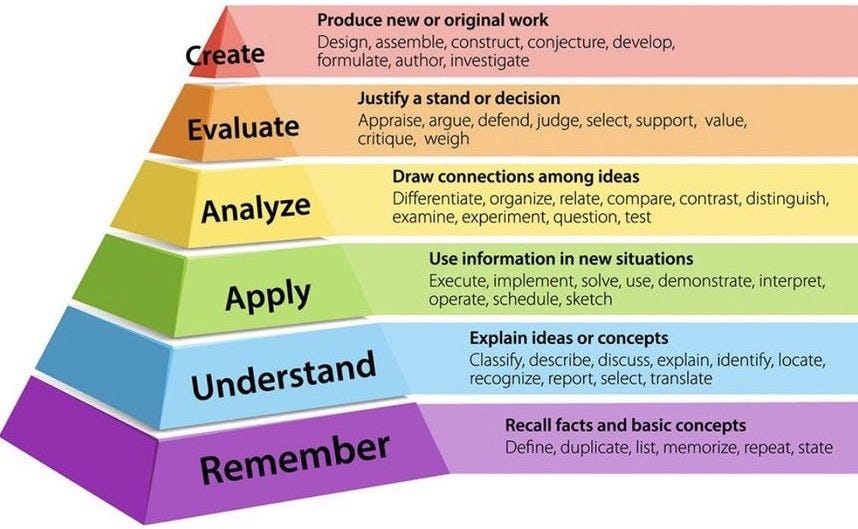✨What Does It Mean to be Educated?: 6 Practices to a Powerful Education
✨Everyone agrees education is broken. But do we agree on what it means to be educated?
The other day, I asked my kids (ages 8 and 11): “What does it mean to be educated?”
Their answers?
👉 Every Kid needs the basics - Reading, Writing, Math
👉 An individualized education unique to each child based on interests
👉 Understand the past to understand humans better
👉 Tools that they can use to improve the future
👉 The ability to educate themselves
I know some of you don’t believe that my kids came up with these on their own, so I’ve included the conversation below. It’s worth listening to how my children think about their own education, and I encourage you to have a similar conversation with your own children.
PS. My kids “speaking” python code ~11mins in is my favorite part. We recorded this in a noisy restaurant so sometimes the filtering is a bit odd - but it’s better than hearing the neighbors’ conversation - and yes I have Socratic Discussions with my kids over breakfast.
You know what never came up in our conversation? Tests.
Even children intuitively understand: Taking and passing tests is not the essence of education.
And yet, every time our culture talks about education, what comes up? Test scores. Yes—declining test scores are a problem, a BIG problem.
But let’s be honest: do high test scores mean a child is educated?
I don’t think so. In fact, I believe high test scores represent the bare minimum of what we should expect for our kids.
Let’s dare to dream bigger, shall we?
To do that, we must first decide what being “educated” means.
There are many ways to frame this discussion, but the most useful might be through the lens of Bloom’s Taxonomy. Bloom’s is flawed for reasons I won’t go into, but for today’s goals, it’s the perfect visual.
Bloom saw learning as a series of increasing complex and challenging skills. At the bottom of Bloom’s pyramid was the ability to remember, understand, and apply - which perfectly align with what tests can measure. Let me be clear: These are essential skills.
Remember: Math facts and formulas, spelling and grammar rules, key historical dates and names.
Understand: Explain why equations work, summarize a story, describe historical events.
Apply: Solve word problems, write grammatically correct essays, make timelines of major events.
These skills represent skills without which, it’s impossible to climb the pyramid.
But too often, we stop here. This is ALL we expect of our children.
But I want more.
I see these skills as the foundation - the beginning, but they are not anywhere close to what it means to be educated. That happens further up the pyramid. Where children learn to…
Analyze → Break things apart, connect ideas across fields and disciplines, read resources with critical eye (is this correct? why or why not)
Evaluate → Form independent opinions, defend them with evidence and logic, change your mind when new evidence is presented
Create → Synthesize something entirely new—an idea, a story, a solution, a building, a tool, a work of art
What does this look like in real life?
Michael Strong , founder of the Socratic Experience, was once invited to help a graduate-level biochemistry class improve their discussions around research papers.
The strange part? Michael had never studied biochemistry. He wasn’t even trained as a scientist.
And yet—he sat down with the paper, teased out the core ideas, spotted the holes in the arguments, and walked into the seminar better prepared than the graduate students themselves.
How?
Because for years he had been training not in biochemistry, but in a discipline far more powerful: thinking. He had practiced breaking things apart, tracing their logic, and testing whether the pieces held together.
Michael had to start from the bottom of a subject he knew nothing about—and climb all the way to the top.
This is what I want my children to be able to do.
I want them to be the kind of people who can wake up one day and say, “I want to learn this,” and know how to begin at the bottom, take the first step, and keep climbing until they not just understand but can analyze, evaluate, and create something new.
THIS is what it means to be educated.
✨Your probably thinking, this is cool Claire but HOW do I do this?
It can feel daunting to move beyond the basics—but beyond we must go.
The good news? There isn’t just one path. There are countless beautiful, unique ways to help your children build the higher-order skills that make them truly educated.
Below, I’ll share six powerful practices that I’ve woven into my children’s lives to improve and hone their thinking. I also provide resources to help you personally get started using them with your family.
Ready? Let’s go.
✨6 Practices to a Powerful & True Education👇
Below, I draw from both classical and modern educational philosophies to teach deep thinking. These are designed to help your child develop intellectual independence, curiosity, and practical wisdom — the qualities that form a truly educated mind.
You don’t need to implement all of these. Every child is unique and different. My oldest learns these skills best through writing and literature, while my youngest is more aligned to math and science. Find a practice that suits YOUR family - keeping in mind it might be different for each child.
A final note → Many of these can start FAR younger than you think. For example, Socratic Dialogue can start even as young as 4 (more in a minute).
ClarifiEd is supported by YOU - not grants, not ads - just you. If you find value in my work, consider subscribing, but more importantly join to give your children the education they deserve.




